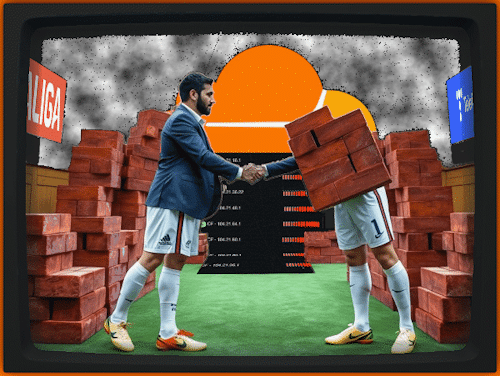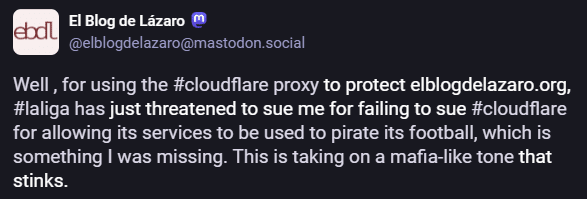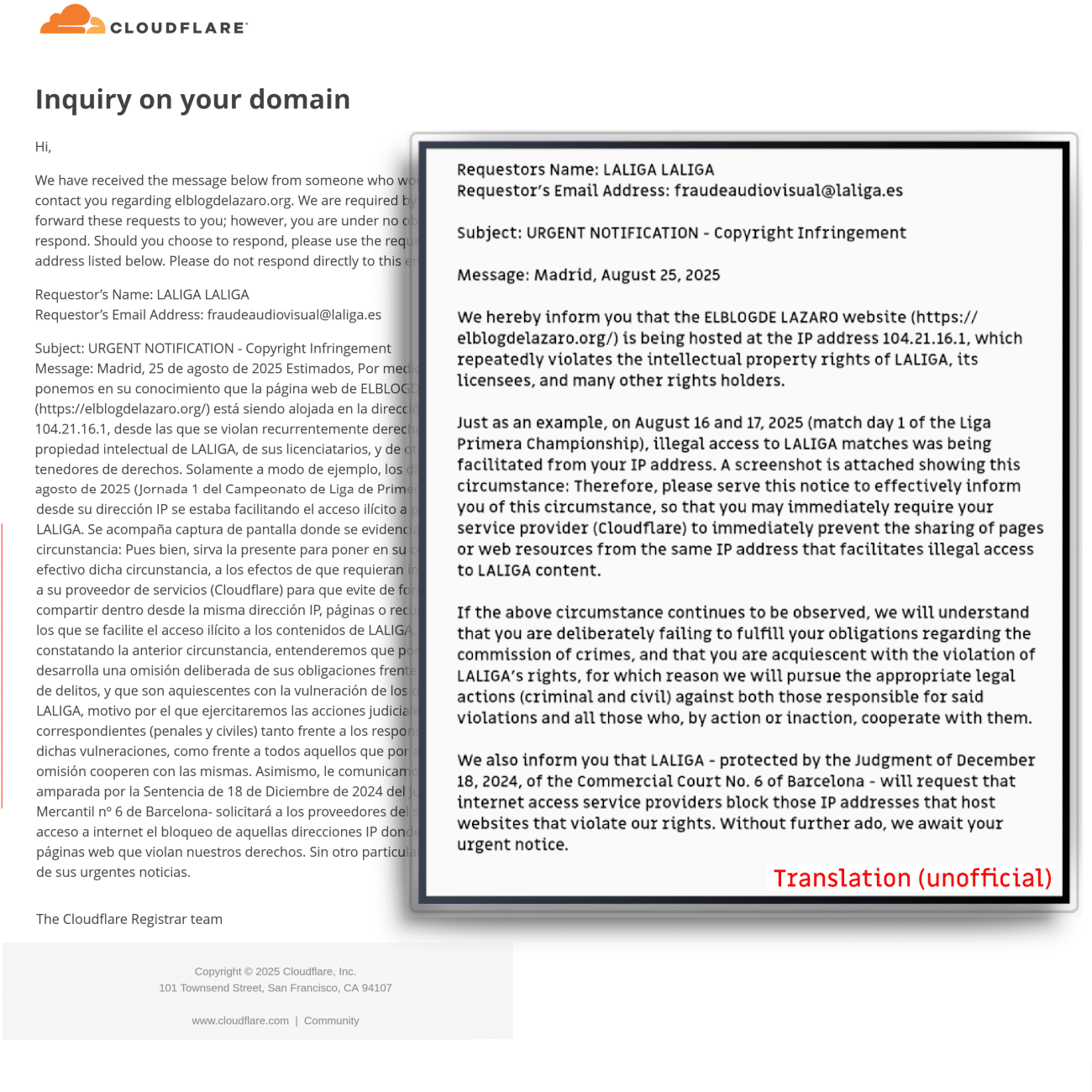 The new football season is underway in Spain’s top professional football league which means LaLiga is also back at work doing whatever it can to block illegal match streams.
The new football season is underway in Spain’s top professional football league which means LaLiga is also back at work doing whatever it can to block illegal match streams.
The final few months of last season were marred by a bitter dispute between LaLiga and Cloudflare, triggered by the former obtaining unprecedented authorization to block Cloudflare IP addresses used for piracy, and then doing so en masse. The resulting fallout was felt by businesses and internet users throughout Spain.
Innocent Cloudflare Customers Can’t Catch a Break
Cloudflare IP addresses are shared, meaning that hundreds or potentially thousands of users (often websites) can operate from the same IP address at the same time. When LaLiga instructs local ISPs to block a Cloudflare IP addresses, to prevent piracy, that invariably leads to large numbers of innocent Cloudflare users being blocked too, despite having no involvement in LaLiga content piracy.
With no evidence to suggest peace has broken out between LaLiga and Cloudflare, blocking of the latter’s IP addresses resumed at the start of the season. Inevitably that means renewed blocking of innocent parties, but according to data reviewed by TorrentFreak, some measures may have been put in place to limit how long IP addresses stay blocked.
While that does little to reduce the number of collateral damage incidents, shortening blocking time reduces the harm suffered by people who have zero connections to online piracy. The caveat here, unfortunately, is an apparent difference of opinion on what constitutes a “connection” to online piracy.
The Blog of Lazarus
After spending just a couple of minutes on Lazarus’s Blog, one gets the impression that the author not only appreciates technology, but also understands the importance of transparency and netiquette, as positive contributors to the online experience.
As an avid user of Cloudflare who takes time to share his experiences with others, a message forwarded to his account by Cloudflare on Monday can only have come as a complete surprise, as his post on Mastodon reveals (translated from Spanish).

A review of the paperwork reveals an extraordinary message containing allegations and assumptions that challenge any reasonable definition of “connections to piracy” and the potential for legal liability to be incurred as a result.
Connection to Piracy: A Cloudflare IP Address
For Spanish speakers, the original message (in two parts) is available here (1,2). Our unofficial translation appears in the image below:

The message and the threats it contains largely speak for themselves. They appear to center around an individual’s use of Cloudflare to protect his personal blog, and an IP address allocated by Cloudflare being abused by an unknown third party to pirate LaLiga content.
Attributing ownership of Cloudflare’s IP address to the blogger, before suggesting that the message puts the recipient on notice of infringement of which he is now fully aware, is bizarre. Yet still not as bizarre as conflating legal use of a shared resource with someone else’s independent abuse, and then implying a responsibility to compel Cloudflare to act on someone else’s behalf.
The suggestion that a failure to act in the manner described is a dereliction of duty, and tantamount to cooperation with unknown third parties in various unknown crimes, is baffling. That the foundation of the alleged offense relies on association by IP address, allocated by an intermediary over which the blogger exercises no control, seems precarious at best.
Whether Cloudflare will intervene is up for debate but for the operator of the Lazarus blog, it’s possible that targeting Cloudflare users is one of the few opportunities left.
“Well, the league clearly knows how #cloudflare works, but the only way they have, for now, is through #cloudflare users themselves, to pressure them to audit and prosecute those who pirate their football or for us to morally stop using their services,” he wrote on Mastodon.
“If there’s football on 5 days a week and they block your website, we won’t say anything about it, and neither will we say anything about the judges who allow it.
“It’s the last attempt by #laliga to get #cloudflare to jump through their hoop, but if they do, prepare for what comes next.”
From: TF, for the latest news on copyright battles, piracy and more.
Powered by WPeMatico
